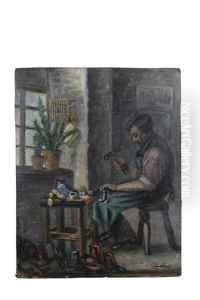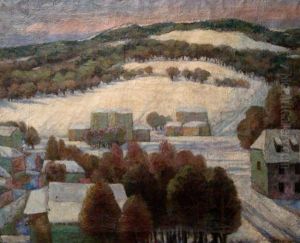Maurycy Apfelbaum Paintings
Maurycy Apfelbaum, though not widely known in the mainstream art world, was a Polish artist whose life and work were significantly shaped by the turbulent events of the 20th century. Born in 1892 in the Polish territory under the rule of the Austro-Hungarian Empire, Apfelbaum grew up during a time of great change and upheaval in Europe. His early life was marked by the diverse cultural influences of the region, which would later be reflected in his artistic work.
Throughout his career, Apfelbaum developed a unique style that combined elements of the avant-garde movements of his time with traditional Polish artistic themes. He was active in the interwar period, a time when Poland had regained its independence after over a century of partitions. During this time, Apfelbaum was involved with a number of artistic groups and contributed to the burgeoning art scene in Warsaw and Krakow.
With the outbreak of World War II and the subsequent occupation of Poland, Apfelbaum's life and work were dramatically affected. Like many artists and intellectuals of the time, he faced persecution under the Nazi regime. The war years were difficult for him, as they were for all Polish Jews. Details of his activities during this period are less documented, but it is known that the war had a profound impact on his artistic output and personal life.
After the war, with the establishment of Communist rule in Poland, Apfelbaum, like many artists, had to navigate the restrictions placed on artistic expression by the government. He continued to create art, but his work from this period reflects the tension between artistic freedom and the ideological constraints of the time.
Maurycy Apfelbaum passed away in 1973, leaving behind a legacy that captures the complex history of Poland in the 20th century. His work is a testament to the resilience of the human spirit in the face of adversity and the enduring power of art to reflect and challenge the times in which it is created. While not as recognized as some of his contemporaries, Apfelbaum's contributions to Polish art continue to be appreciated by those who seek to understand the rich tapestry of Poland's cultural history.






